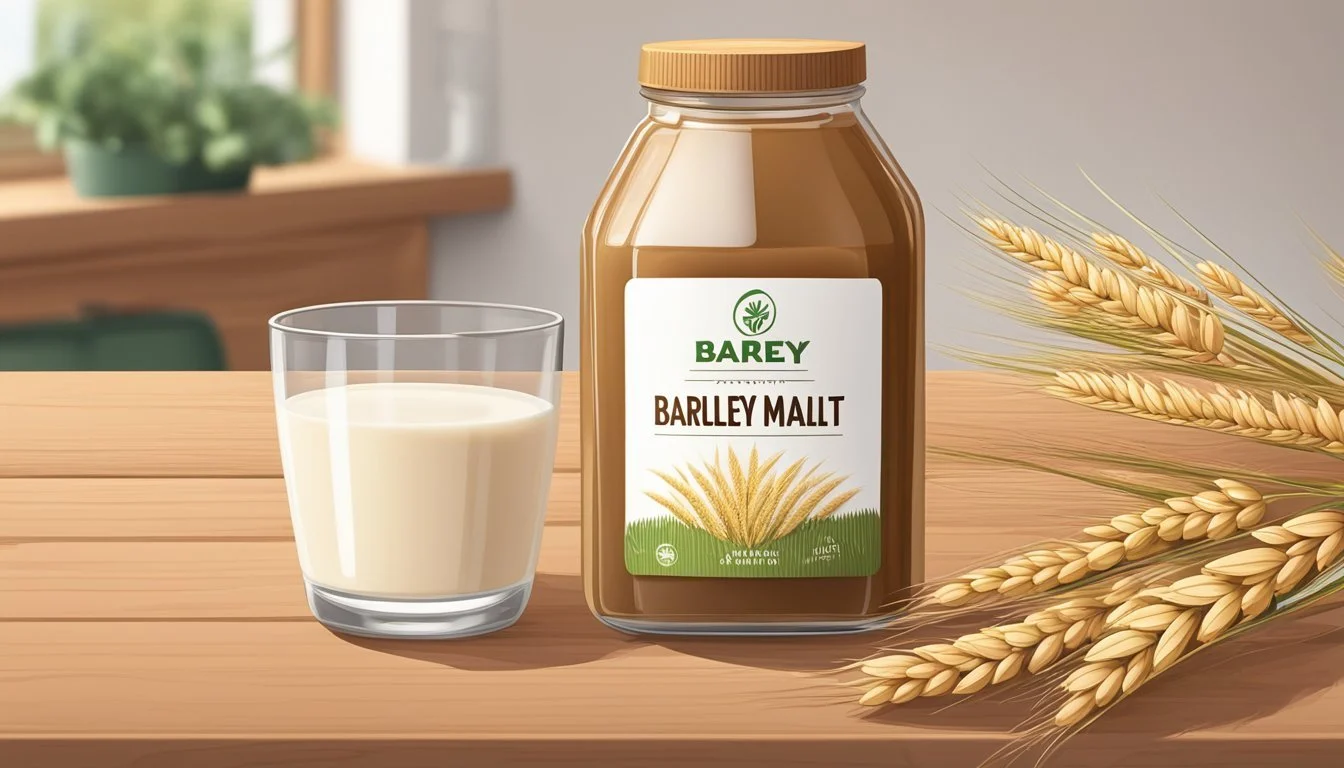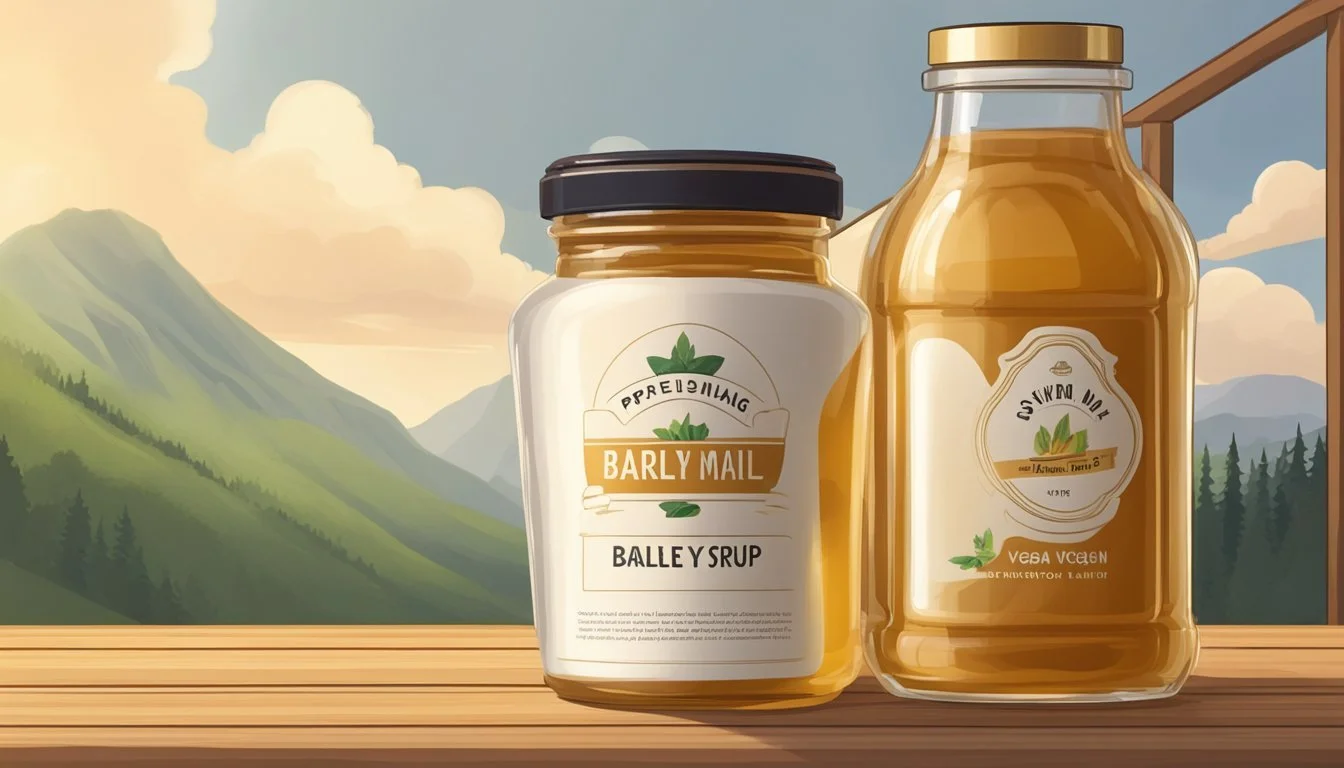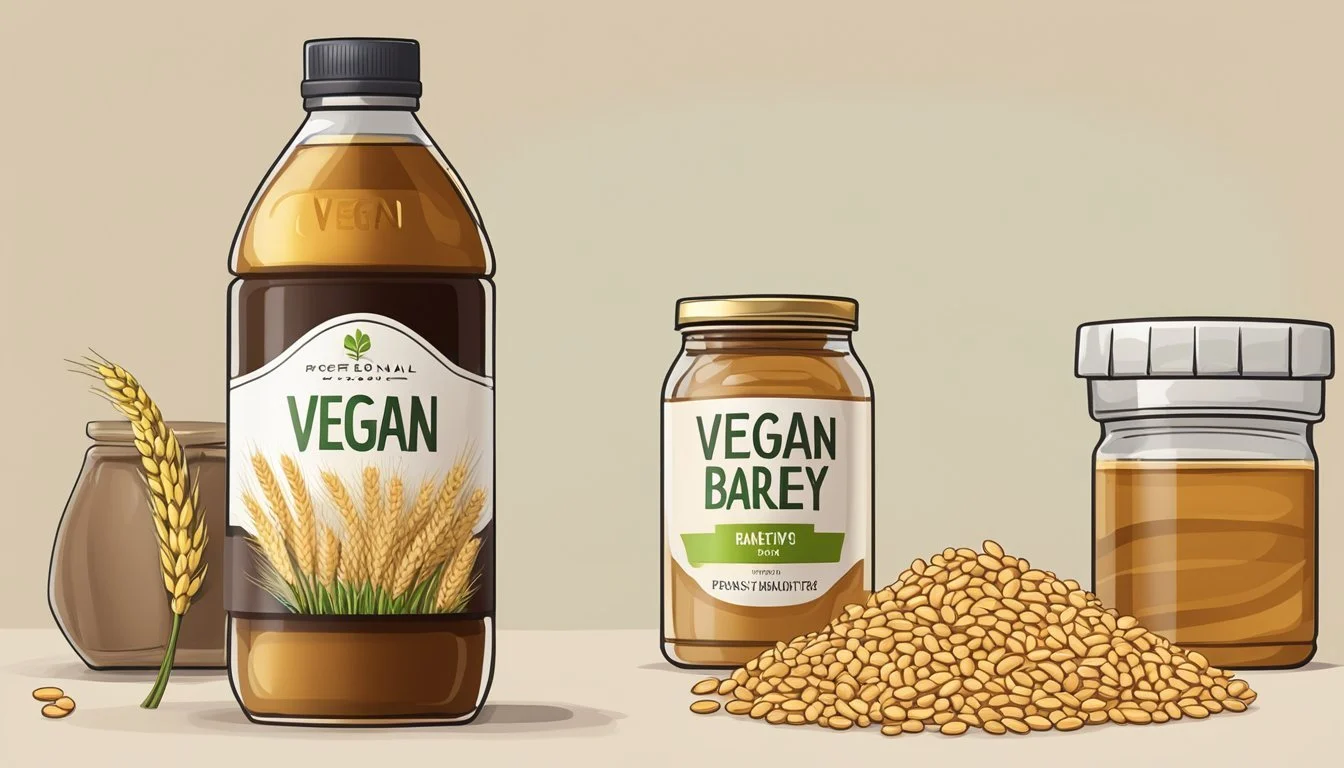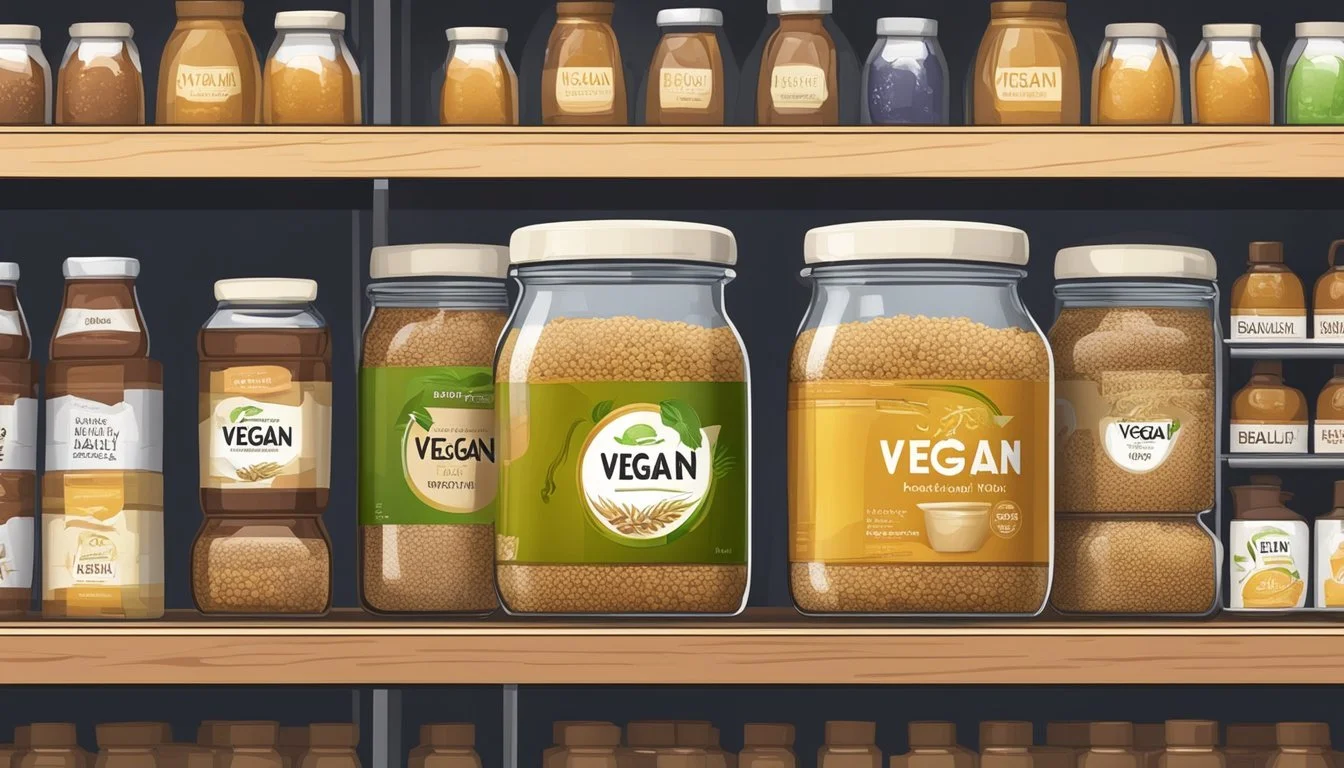Is Barley Malt Syrup Vegan?
Unveiling the Truth About This Sweetener
Barley malt syrup is a natural sweetener derived from sprouted barley grains. This syrup is known for its distinctive, rich flavor and is a common ingredient in various food products, including breads, beverages, and sauces. Within the vegan community, the question of whether barley malt syrup aligns with vegan principles is significant. Vegans avoid all animal products for ethical, environmental, or health reasons, and thus, any food item they consume must be free from animal derivatives throughout its production process.
The production of barley malt syrup involves malting, where barley grains are soaked, germinated, and then dried. This process activates enzymes that convert the grain's starches into sugars, resulting in the thick, sweet syrup. Because this method does not inherently require any animal products or by-products, barley malt syrup can be considered vegan. However, vegans might scrutinize the production process further to ensure there is no cross-contamination or use of animal products at any stage.
In the context of prepared and packaged foods, considerations may extend beyond the ingredient itself to include the use of additional sweeteners or processing aids that could be of animal origin. Transparency in labeling and sourcing is critical for those following a strict vegan diet. Vegans looking to include barley malt syrup in their diet would therefore benefit from seeking products that provide clear assurance of their vegan status, whether by labeling or through the manufacturer's information.
Understanding Barley Malt Syrup
Barley malt syrup is a plant-based sweetener, derived from malted barley, that is recognized for its distinct malt flavor and nutritional properties.
Production and Ingredients
The production of barley malt syrup involves the malting process. This process starts with barley grains which are allowed to germinate. During germination, natural enzymes are activated which break down the starches into sugars. The germinated barley is then dried and cooked to produce a thick syrup known as wort. The main ingredients of this syrup are derived exclusively from the malted barley, making it a product with no animal-derived substances.
Nutritional Profile
Barley malt syrup contains nutrients such as protein, iron, potassium, and magnesium. While it is not a low-calorie sweetener, it offers a moderate glycemic index compared to other sweeteners. The syrup also provides a source of complex carbohydrates, which can be a valuable part of a balanced diet.
Flavor Characteristics
The sweetness of barley malt syrup is less pronounced than that of refined sugar, providing a gentle sweetness with a robust malt flavor. Its unique flavor profile is often described as rich and flavorful with a slightly bittersweet undertone. This characteristic flavor makes it a popular choice for both sweet and savory culinary applications.
Veganism and Animal Products
Veganism is defined by the choices individuals make to avoid using or consuming animal products. This commitment extends to all facets of life, from diet to clothing, and affects ingredient selection in food production. In the context of determining whether barley malt syrup is vegan, it is imperative to understand the distinction between vegan and non-vegan products.
Defining Vegan Products
A vegan product is one that is free from any and all animal-derived components. This aligns with the vegan ethos that eschews the exploitation of animals for any purpose. Ingredients in vegan products are sourced exclusively from plants, minerals, or synthetic materials that do not involve animals at any production stage.
Vegan Ingredient Checklist:
Plant-based: Derived from fruits, vegetables, grains, legumes, nuts, and seeds.
Animal-free: Contains no meats, dairy, eggs, honey, or other substances directly obtained from an animal.
Cruelty-free: Manufactured without animal testing or harm.
Common Non-Vegan Additives
Despite a product's primary ingredients being plant-based, some non-vegan additives can compromise its vegan status. Individuals following a vegan lifestyle meticulously scrutinize labels for hidden animal-derived substances. For instance, isinglass, a substance obtained from fish bladders, is notoriously used in the beer clarification process but is not vegan.
Typical Non-Vegan Ingredients:
Isinglass: Used in fining of beers and wines.
Gelatin: Derived from animal collagen and used as a gelling agent in food and pharmaceuticals.
Casein: A milk protein that is sometimes present in "non-dairy" products.
Lactose: A sugar obtained from milk.
Food manufacturers using the vegan label ensure that no such substances are included in their products, thereby asserting their commitment to the vegan lifestyle.
Barley Malt Syrup in a Vegan Diet
Barley malt syrup is a sweetener derived from barley that appeals to many vegans seeking natural alternatives to refined sugars. This section explores its vegan status and compares it to other sweeteners.
Evaluating Vegan Status
Barley malt syrup is produced through the fermentation of malted barley, similar to the initial processes in beer making. The syrup consists of maltose, a sugar that results from the enzymatic breakdown of starches in the barley grain. Beer yeast or other fermentation agents are often employed to catalyze this reaction. In the realm of sweeteners, vegan consumers meticulously verify that products do not involve animal derivatives or by-products in their creation. While most barley malt syrups are vegan, as they generally lack animal-derived ingredients, there might be exceptions based on the specific practices of manufacturers. For a sweetener to be vegan, it must avoid the use of animal products and by-products throughout its entire production process, including any filtration through animal-derived substances.
Vegan Considerations for Sweeteners:
Animal-derived ingredients? No use in typical barley malt syrup production.
Production process: Avoidance of non-vegan additives or processing agents is crucial.
Label checking: Essential for ensuring the product is free from animal derivatives.
Comparison with Other Sweeteners
When vegans compare barley malt syrup to other sweeteners, they consider the refinement process and the source of sweetness. Barley malt syrup is less refined than white table sugar (sucrose), which often appeals to those seeking a less processed product. It also offers a distinct malt flavor that can be more desirable in specific recipes.
Comparison Table:
Sweetener Source Vegan Status Note Barley Malt Syrup Malted barley (fermentation) Generally Vegan Check for non-vegan additives. Honey Bees Not Vegan Produced by bees. Maple Syrup Maple tree sap Vegan Natural and unrefined. Rice Syrup Fermented rice Vegan Similar production process to barley malt. Blackstrap Molasses Sugarcane byproduct Vegan Rich in minerals, less refined. Table Sugar (Sucrose) Sugarcane or Sugar beet Mostly Vegan May be processed with bone char. High-Fructose Corn Syrup Corn starch Vegan Highly refined and processed.
Barley malt syrup's primary sugar component is maltose, which is less sweet than the fructose in items, such as honey or the sucrose in table sugar. It's positioned as a natural sweetener in contrast to refined sugars, especially as consumers are increasingly critical of highly processed ingredients. However, one should be aware that the term "natural" does not necessarily equate to "healthier", as all sweeteners should be consumed in moderation.
Culinary Applications
In the culinary world, barley malt syrup is a versatile natural sweetener that offers unique flavor and textural properties to a variety of dishes.
Cooking and Baking
In baking, chefs often use barley malt syrup for the distinct malty flavor it imparts. It is particularly sought after in bread-making, where it not only sweetens the loaf but also contributes to a moist crumb and a glossy crust. For example, pumpernickel and other dark breads gain both color and a subtle sweetness from this syrup. Similarly, bagels and pretzels feature barley malt syrup in both the dough and boiling water to enhance flavor and achieve the signature shiny finish.
Specialty Foods
Barley malt syrup shines as a star ingredient in certain specialty foods. Due to its rich, deep flavor, it's common in the production of malt bread and is also used in creating malted milkshakes, lending them a distinctive taste that can't be replicated with other sweeteners. Moreover, the syrup can be utilized to craft exceptional gingerbread and pancakes, offering a complexity that stands out from the norm.
Consistency and Binding
The syrup's remarkable consistency serves a dual purpose: it acts as both a binder and moisture-retention agent, which is particularly beneficial in the preparation of baked goods like muffins and pancakes. It lends a desirable chewiness and extends the shelf life of these products by helping to maintain their moisture content. Its viscosity impacts mouthfeel, giving desserts a denser and more satisfying texture. Additionally, in the leavening process of baked items, it can aid in fermentation, providing food for yeast to promote rise and enhance consistency.
Health and Dietary Considerations
When considering barley malt syrup in the context of health and dietary needs, individuals should weigh its nutritional attributes against its gluten content and potential allergens.
Benefits and Limitations
Barley malt syrup offers certain health benefits due to its content of maltose and small amounts of amino acids. As a sweetener, it's less refined compared to white sugar, which might provide a more gradual release of energy. However, it’s important to note that barley malt syrup still contains fermentable sugars that can affect blood sugar levels. Therefore, those with diabetes should use it cautiously, as should individuals who are calibrating their intake of sweeteners.
Nutritional Breakdown:
Primary Sugar Content: ~65% maltose
Other Constituents: Minimal sodium levels, amino acids
Barley malt syrup is not a calorie-free sweetener and should be used in moderation within a balanced diet.
Allergens and Gluten Content
Barley grains are naturally not gluten-free, and since barley malt syrup is derived from malted barley, it does contain gluten. This makes it unsuitable for anyone with gluten intolerance or celiac disease. Individuals who follow a gluten-free diet should avoid barley malt syrup and seek alternative sweeteners.
Gluten and Allergen Consideration:
Contains gluten: Yes, from barley grains
Suitable for gluten-free diets: No
Barley malt syrup should also be considered as a potential allergen for those who have sensitivities specific to barley or other grains. Always review product labeling to ensure safety for those with allergies.
Environmental and Sustainability Issues
This section examines the sustainability of barley as an agricultural product and explores the ethical considerations associated with its production, particularly as they relate to veganism.
Sustainability of Barley Cultivation
Barley is a globally significant cereal crop, and its cultivation plays a substantial role in food and beverage industries. The sustainability of barley farming is tied to practices that reduce environmental impact, such as efficient water usage, maintaining soil health, and the implementation of crop rotations to prevent soil depletion. As barley serves as the foundation for malt syrup, it’s crucial to consider how its growth affects ecosystems. Malting barley, the specific type used in barley malt syrup, can influence sustainability efforts depending on the agricultural practices employed.
Ethical Considerations
Vegans often scrutinize the impact their food choices have on animals and the environment. The central concern when evaluating if barley malt syrup is vegan involves assessing whether animal products are used or animal welfare is compromised during any stage of production. While barley itself is a plant, vegans are interested in the agricultural methods used to grow the crop and how these practices may affect local wildlife and broader ecosystems. This encompasses not only the direct use of animal-derived substances but also the indirect consequences of farming on habitats and species.
Labeling and Availability
When selecting barley malt syrup, buyers should be vigilant about labels and availability. Understanding the nuances of labeling can help ensure that the product adheres to vegan standards. Availability varies based on location and store, influencing price and storage options.
Identifying Vegan Labels
Shoppers should look for certification symbols such as the "Vegan Action" or "Vegan Society" logos to confirm a product is vegan. Ingredients lists and product descriptions are critical, as non-vegan ingredients may be present in some brands. Barley malt syrup without animal-derived elements or cross-contamination in processing meets vegan criteria.
Purchasing and Storage Tips
Barley malt syrup can typically be found in health food stores or sections within general groceries. Shelf presence may vary, so customers might also consider online stores, where broader options exist. To maintain freshness, barley malt syrup should be stored in a cool, dry place, preferably in an airtight container. Prices may fluctuate based on brand, organic certification, and retail location.
Conclusion
Barley malt syrup, derived from sprouted, malted barley, is essentially plant-based, positioning it within the perimeter of vegan-friendly ingredients. This dark, rich sweetener stands out for its distinctive malty flavor, contributing to its status as a versatile ingredient in the culinary realm. Vegans, however, often consider the broader implications of food production processes.
Culinary Uses:
Sweetening beverages and baked goods
Glazing for vegetables (e.g., sweet potatoes)
Incorporated in sauces and dressings
The ambiguity concerning its vegan status stems not from the primary ingredient but from potential gray areas in manufacturing. These may include the involvement of animal-derived substances or byproducts in refining or processing, although these cases are not the norm.
Key Considerations for Vegans:
Examination of brand-specific practices
Assessment of the production process for possible animal product usage
Diligence in label scrutiny to ensure no non-vegan additives
In deliberating whether barley malt syrup aligns with one's vegan principles, it remains incumbent upon the individual to conduct thorough research into the syrup's origins and the ethos of its production. The availability of multiple alternatives ensures that vegan consumers can choose according to their preferences and ethical standards, making barley malt syrup an optional sweetener in a plant-based diet.








